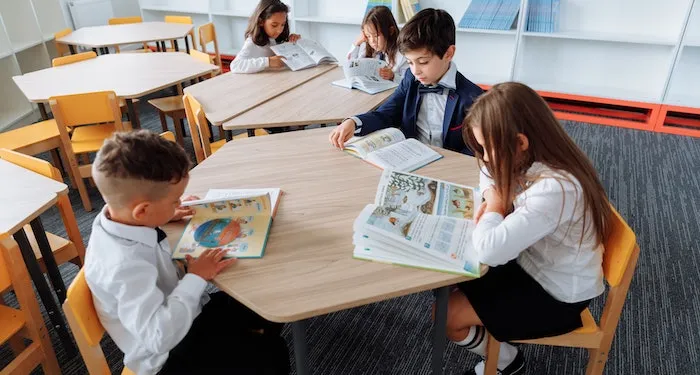
Tips For Authors Visiting Schools
As a school librarian, having an author visit is an exciting event, and it can make a huge difference to student engagement in the library. In fact, I’ve written before on the impact of author visits in schools. However, it can also be daunting and even nerve-wracking for the author, especially if they are recently published and don’t have a lot of experience speaking in front of large crowds — and especially when those crowds are teenagers.
I’ve put together some tips for authors based on things I’ve noticed and experienced in eight years of hosting author visits in schools. For an author that has done many visits, this might seem like second nature, but for authors new to the process, here’s a quick a checklist of things to go over.
Touch Base Before the Visit
This can be done in simple ways. First, you need to establish a contact. If you are lucky and the school you’re visiting has a librarian, they will be your contact (or should be). If contact has been lost, the best thing to do is call reception and ask to speak to them.
Once contact has been made, you can interact in small ways that engage the students. We recently had an author send us a pack of postcards, posters and bookmarks. This is never mandatory but makes a huge difference if the publisher can provide them!
If an author is seeing a particular class or group, these freebies go a very, very long way. As the librarian, I will be promoting an author’s visit heavily, visiting classes and assemblies, having freebies is always good.
We’ve also had an author submit a short video to promote their author visit and to thank the class for reading their book. It was an inspiring message that went a very long way. Other times, a quick Twitter message to the group can also have an impact: it doesn’t have to be big, just whatever an author is comfortable with. In my experience, the students are always somewhat shocked that an author has interacted with them directly!
Read Aloud

I’m not saying an author has to read aloud, but I feel it makes a big difference. I read aloud to secondary school students every day of the week and I can see how well those books move off the shelves compared to others. Reading aloud to any age creates a vital connection between the listener and the world of that book, not to mention the author and the students. It can be a vulnerable place to be, but it’s worth it.
It took some time for me to muster up the courage to read aloud to teens, because we are conditioned to think it’s only for elementary age children but the reality is much different. The teens I work with really enjoy having someone read aloud, especially when it’s a guest and not just me!
Have Questions for the Students Prepped
There’s nothing worse during an author visit than dead air. However, it does happen, and it’s not the end of the world. I will always have questions in my back pocket ready to go in case the students are shy or not fully engaged with what’s going on, but this is a two way street. It’s really helpful to everyone involved if the author also has a list of questions for the students or even teachers in the room. Sometimes the students get shy or simply forget to ask questions, and it puts a lot of pressure on the librarian, especially if they themselves are new to the position. If the author also has some questions, however, it creates a good give and take that allows for some breathing room.
Not only questions prepped in advance, but invoices as well! Having an invoice in advance makes sure the payment goes through much faster.
Go With The Flow
Things go wrong from time to time. The main thing is to run with it and remember that nobody is trying to make a visit difficult. We’ve had virtual author visits where they couldn’t hear us at all, so we typed the questions to her, and it worked fine.
During one of the first visits I ever organised, I brought in two year groups into the school Hall only to realise half the Hall was blocked off for construction and the students had to almost sit on top of each other. The author loved how many people were there to see him, but I can assure you the teachers and myself were not so chilled out! It always works out in the end.
With this point, communication is key. Here are a few questions to clarify before the visit:
- Do you need a parking space?
- Are you bringing a Mac laptop or a PC?
- Do you have specific dietary needs?
- Do you require sound or a projector?
- Do you feel comfortable talking to 500 students at once or would you rather have only 30?
- Do you have a “hard out” and can’t stay for signing books?
- Do you want the librarian to organise books to be sold ahead of time or are you bringing your own books to sell? If they do, try to find a local bookshop to help out!
Also, alerting reception before the visit of who is coming and when also makes their lives much easier.
Check with the IT department well in advance of any needs: I set things up the night before (when possible) so if any tech issues do arise, they can be tackled quicker.
All of these things should be covered by you and the librarian or whoever organises school visits well ahead of time.
Be Flexible
This is related to point four in a way. When authors visit our library, I always try to engage them in unique ways. I get them to sign our David Bowie “Read” poster and ensure a display of some kind has been created that they can take photos of to promote their visit on social media.
In the past, we’ve had authors cut the ribbon on our book swap, play “5 Second Rule,” provide inspiring messages that I’ve put on postcards for teachers, and of course be interviewed for our student-led podcast. They’ve even handed out brownies during our Books & Brownies program. I feel like having an open mind is key.
With all of this, it must be said that as an author you should be paid for your work and any “extra” work you are asked to do. I have in the past had authors visit for free, I am eternally grateful for their time. However, I know how hard it is to make a living, as an author and paying someone for doing work for you is simple common sense. Schools can combine forces and make ends meet to bring authors in.
There is a ton of evidence to show that author visits have a lasting impact on students. If you are a librarian or school staff member and have the ability to bring an author in, I highly recommend it. It can be anxiety-inducing, but it is completely worth doing.





